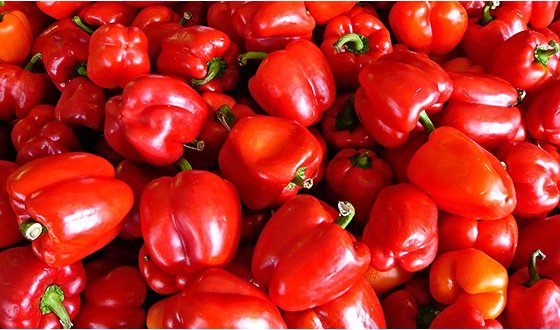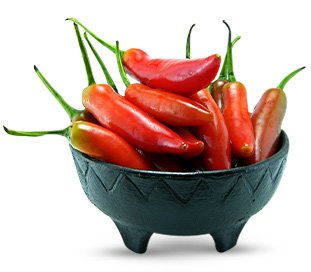If you've been in the iron game for some time, you've probably been through at least one diet. You know the deal... One morning you step out of the shower and—Whoa!—who's that dude in the mirror with bulging love handles? With a deep frown you hit a few ab-poses, only to realize that the pounds you gained over the past few months wasn't just muscle mass. Fortunately, the remedy is simple enough: Some serious time on the Stairmaster and 2-3 months of disciplined dieting will get you right back on track.
The Bad News
Now for the bad news: Skinless chicken breasts and tuna get really, really boring in a hurry. But you probably knew that already. Part of the problem with this type of low-fat foods is that fat is a key component in conveying flavor, as seen in low-fat cheese vs. regular cheese and so forth. In a way, cutting down on fat almost automatically mean cutting down on flavor.

But there is a way out of the blandness: Hot peppers. It should be no big surprise that peppers can spice up your plate, but did you know that they have the added benefit of aiding your dieting efforts as well? Hot peppers contain small amounts of a substance called capsaicin which is thermogenic, i.e. raises your body temperature and helps you burn extra calories.
Capsaicin And Dieting
In it's pure form, capsaicin is to your tongue what Kryptonite is to Superman. Fortunately, the concentration in regular hot peppers is relatively low and will settle for setting your mouth on fire and make you sweat buckets. This food-induced sweating is a sure sign of your metabolism picking up.
So how do you include peppers in your diet? Your first stop is to check your local grocery store. Many Mexican and Thai sauces and spice-mixes are loaded with pepper while adding hardly any calories at all to your diet. Salad is generally not popular in bodybuilding diets, but it can serve as a nice, healthy filler when you're cutting up if you skip the fatty dressings and add a handful of hot peppers.
Other than that, you should experiment to find what suits you the best. Do you like the taste of chili-powder on your chicken breasts? How about that Thai sauce with your fish? Will a bag of dried datils make a nice movie-snack? (The answer to the last one is probably no, but if you decide to give it a shot, make sure to have a friend snap a photo of you with smoke coming out of your ears and your eyes bulging out of their sockets and send it here.)
Fat = Flavor
Remember what I said earlier about fat being a key component in conveying flavor? That is somewhat true for hot peppers as well. Capsaicin is oil-based, but thanks to its strength it takes negligible amount of fat to deliver the blast. On a side note, this means water will not help if you overdose on pepper. In fact, gulping water only helps flush the capsaicin around your mouth making it worse. Instead, chew a piece of bread or something that will help soak up the oil.

There used to be concerns about the safety of hot peppers, as some people doubted it could be healthy to eat such spicy food on a regular basis. Research in recent years have shown that capsaicin is perfectly safe for normal, healthy individuals (check with your doc if you have a tendency to get ulcers and the like.)
Conclusion
In conclusion, hot peppers is a great way to break out of the blandness of a diet, especially since it gives your fat-burn an extra boost. They're safe, they're healthy and they're helping you reach your goals. Just remember to keep a piece of bread handy if it gets too overwhelming, and don't forget to have a breath mint afterward.
